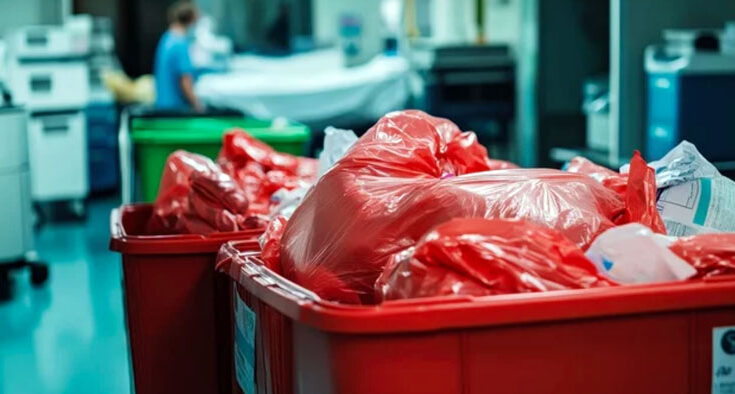When you think of medical waste, you probably picture hospitals, laboratories, and large healthcare facilities. But the truth is, hundreds of small businesses generate medical or biohazardous waste every day – from dental clinics and tattoo studios to physiotherapy centers, wellness spas, and even beauty salons.
For many of these businesses, proper waste disposal isn’t just a legal obligation. It’s also a matter of public safety, environmental protection, and brand reputation.
Here’s why understanding medical waste management matters – and what every small business should be doing to stay compliant and responsible.
What Qualifies as “Medical Waste” for Small Businesses?
Medical waste includes any material that has come into contact with bodily fluids, sharps, or potentially infectious substances. You don’t have to be a hospital to produce it.
Examples include:
- Needles, syringes, and lancets used in clinics or wellness centers.
- Bandages, gauze, or gloves used during wound care or first aid.
- Contaminated swabs or testing kits used in pharmacies or labs.
- Used razors, piercing needles, or tattoo supplies.
- Expired medications or pharmaceutical samples.
If any of these items are improperly discarded in regular trash, they can harm sanitation workers, contaminate recycling streams, or end up polluting local environments.
The Hidden Risks of Improper Disposal
Small businesses often underestimate the risks associated with medical waste. The consequences can include:
- Health hazards – Used sharps and contaminated materials can transmit diseases such as Hepatitis B, Hepatitis C, or HIV.
- Environmental pollution – Chemicals and biological agents can leach into soil and water sources.
- Regulatory penalties – Failing to comply with medical waste disposal laws can lead to heavy fines and potential business shutdowns.
- Reputation damage – A single report of unsafe disposal can severely impact community trust.
The safest approach? Work with a licensed medical waste management provider that handles everything from collection and treatment to final disposal.
The Benefits of Professional Waste Management for Small Businesses
Proper waste handling might seem like an added expense – but it’s an investment in your business’s safety, sustainability, and professionalism.
Partnering with an experienced provider ensures:
- Full compliance with state and federal regulations.
- Secure containment and transport of sharps and biohazards.
- Scheduled pickups tailored to your business size and waste volume.
- Proper documentation to protect you during audits or inspections.
- Environmentally responsible disposal that minimizes pollution.
These services are especially important for smaller operations that lack in-house compliance teams or waste infrastructure.
Making Medical Waste Management Simple
The good news: it doesn’t need to be complicated. Small business owners can take a few simple steps to stay compliant:
- Identify your waste streams – Understand what materials qualify as medical waste.
- Use proper containers – Sharps should go in puncture-proof containers; infectious waste in labeled red bags.
- Schedule regular pickups – Don’t allow waste to accumulate on site.
- Keep records – Maintain manifests and disposal certificates for inspections.
- Train your team – Ensure staff know how to handle and separate waste safely.
Consistency is key. Even small lapses in handling can lead to major liabilities later on.
Small Business, Big Responsibility
Running a local business means being part of a community – and with that comes responsibility. Whether you’re providing medical care, aesthetic treatments, or wellness services, safe waste management protects not just your clients but also your neighbors and local environment.
By taking proactive steps and working with trusted providers, small businesses can uphold the same health and safety standards as hospitals – without the hassle.
At the end of the day, responsible waste management isn’t just about compliance. It’s about care.
Key Takeaways
- Many small businesses unknowingly produce medical waste.
- Improper disposal poses health, environmental, and legal risks.
- Partnering with a licensed company ensures compliance and safety.
- Proper containment, labeling, and staff training are essential.
- Safe waste management reinforces professionalism and community trust.
Frequently Asked Questions
1. Do small businesses really need a medical waste contract?
Yes. Any business that generates sharps or potentially infectious waste must follow federal and state disposal laws, regardless of size.
2. How often should waste be collected?
Collection frequency depends on volume and state regulations – typically weekly or bi-weekly for small clinics.
3. Can small businesses use regular trash services for medical waste?
No. Regular waste services are not licensed to handle biohazardous or sharps waste.
4. Is it expensive to work with a disposal provider?
Most services offer flexible pickup schedules and pricing tailored to small operations.
5. What happens after collection?
Waste is safely sterilized, treated, and disposed of under strict environmental standards – ensuring zero contamination risk.










